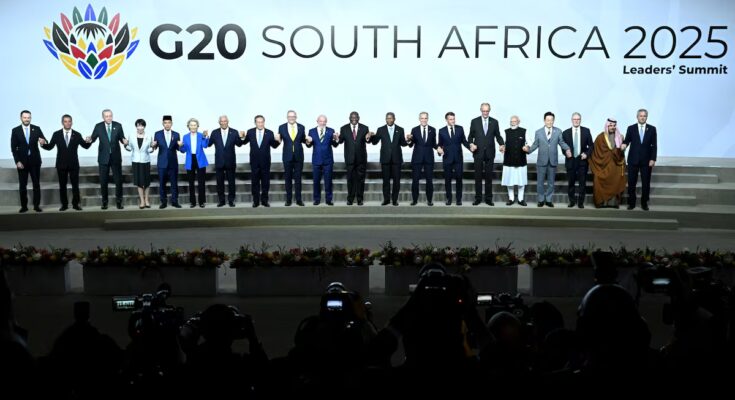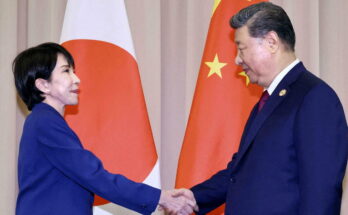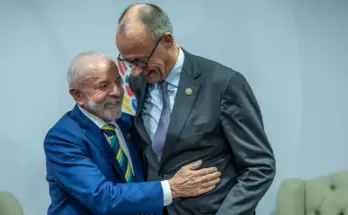The G-20 summit in Johannesburg this weekend is a stark portrait of the bloody battle between those who want to keep alive a rules-based multilateral order and those who are waging a blatant attempt to demolish it to shape the future of the world based on force in an even harsher way than has been done so far.
The boycott of the summit by the United States, the contempt of Russia (which sent a third-rate official), the eloquent absence of the Saudi crown prince – recently welcomed to the White House, where Trump supported him by stating that the dismemberment of a Saudi journalist in a consulate of the Desert Kingdom in Turkey is part of the things that happen in life – or of the president of Argentina – a country that has just received an economic rescue plan from Washington and which he refused to sign the joint declaration – are the emblem of the assault.
This took on even starker tones when a peace plan for Ukraine, drawn up by Trump’s advisers, emerged shortly before the summit without involving either the invaded country or the Europeans. This is a unilateral initiative that replicates transactional patterns based largely on a logic of material benefit to Washington. In the case of Ukraine, the United States seeks to cut reconstruction work and mineral resources. In the case of Gaza, this horizon and the interest in doing business with the rich Sunni autocracies that Israel challenged with an attack on Qatari territory are also emerging. The same happens with the mediation between Azerbaijan and Armenia, where the exploitation of a fruitful energy and transport corridor is ensured.
On the other hand, a heterogeneous galaxy of countries is emerging that are trying to resist the demolition, either on principle or because it suits their interests since they do not currently have the necessary force: military and technological. Thus, in Johannesburg, the countries of the South of the world and those of Europe came together to try to save a common declaration that the United States tried to boycott.
Washington, which left the chair empty with the fallacious argument that genocide is being carried out in South Africa against the country’s whites, tried to argue that since the G-20 works by consensus, a joint declaration could not be approved in its absence. But the South African presidency refused and, actively supported by others – including the Europeans – advanced with the option of a joint statement.
“We cannot allow anything to diminish the value, stature and impact of Africa’s first G20 presidency,” said Cyril Ramaphosa, President of South Africa. His foreign minister, Ronald Lamola, was more explicit in statements to public broadcaster SABC: “The multilateral platform cannot be paralyzed on the basis of the absence of someone who was invited. The G-20 is not about the United States. It is about all its members. We are all equal members of the G-20.”
The declaration is a 30-page document without major political commitments. As the agreement reached this Saturday at COP-30 in Bethlehem, also based on a low common denominator, demonstrates that multilateralism is not dead, but its effectiveness is seriously suffering due to the current geopolitical configuration of the world.
Different fronts of the assault
The assault is clear and is being fought on several fronts. Weakening of international institutions – boycotting their functioning in structures or funding; violation of United Nations principles, whether those of territorial integrity or sovereignty, or of human rights; democratic setbacks; climate denialism; retrograde civil rights policies.
The wrist is not fought between two well-defined blocks. The EU and some of its member countries have not taken action to defend a rules-based world, in the case of Gaza. China – whose leader Xi Jinping did not travel to Johannesburg – claims to be a supporter of the rules-based multilateral order, but does not hesitate to ignore international court rulings when it wants, or to impose coercive economic measures when it suits it from a position of strength.
“Weaponizing dependencies only creates losers. We must return to a rules-based system,” European Commission President Ursula von der Leyen said in a speech at the opening session of the summit that no doubt referred to China, but could well apply to the United States.
The joint declaration develops on the axes that the South African presidency has promoted to advance issues of interest to the Global South. Thus, sections appear dedicated to resilience and response to climate disasters, debt sustainability or the fair and sustainable exploitation of strategic minerals. The text contemplates the concepts of gender or climate change considered anathema by the Trump administration.
However, the wording of the 30-page document and the political attitude of many signatories do not suggest much concrete progress on the basis of what was agreed. The text, for example, includes a reference to the fact that states must refrain from resorting to “force to obtain territorial acquisitions against the integrity and sovereignty” of others. Without a doubt, Russia must not have liked the passage, but it did not explicitly refuse to sign it. It is the measure of the commitment – close to zero – of many who cannot explicitly leave the forum.
“It’s a serious blow (to multilateralism),” says John Kirton, director of the G-20 research group, present in Johannesburg, referring to all the absences. “The most powerful leader of the G20, the president of the United States, has never been absent from the summit. And although the reason for the absence is bilateral, due to unfounded accusations against South Africa, this has an impact on the functioning of the G20 because it alters the functioning of the troika of countries succeeding the presidency,” says Kirton. The United States is the country that will assume the rotating presidency of the G-20 after this summit.
Kirton recalls that Scott Bessent, US Treasury Secretary, announced that the G20 will “go back to basics”, which, according to the expert, will mean, among other things, “fewer ministerial meetings”, probably a smaller range of topics, possible vagaries when it comes to inviting full members. Trump, for his part, announced that the 2026 summit will be held at one of his golf courses in Miami. These do not seem to be the best conditions for a forum which, despite not having executive capacity, constitutes an important mechanism of international cooperation.
Since the end of the Cold War, the world has taken significant steps towards the dream of a rules-based multilateral order. The World Trade Organization and the International Criminal Court were founded, the newly formed Intergovernmental Panel on Climate Change was consolidated and other initiatives flourished. But the pendulum of history changed direction before that dream could be realized. The G20 summit in South Africa highlights the global battle between those who seek to demolish multilateral cooperation in this era and those who defend at least some parts of it.



